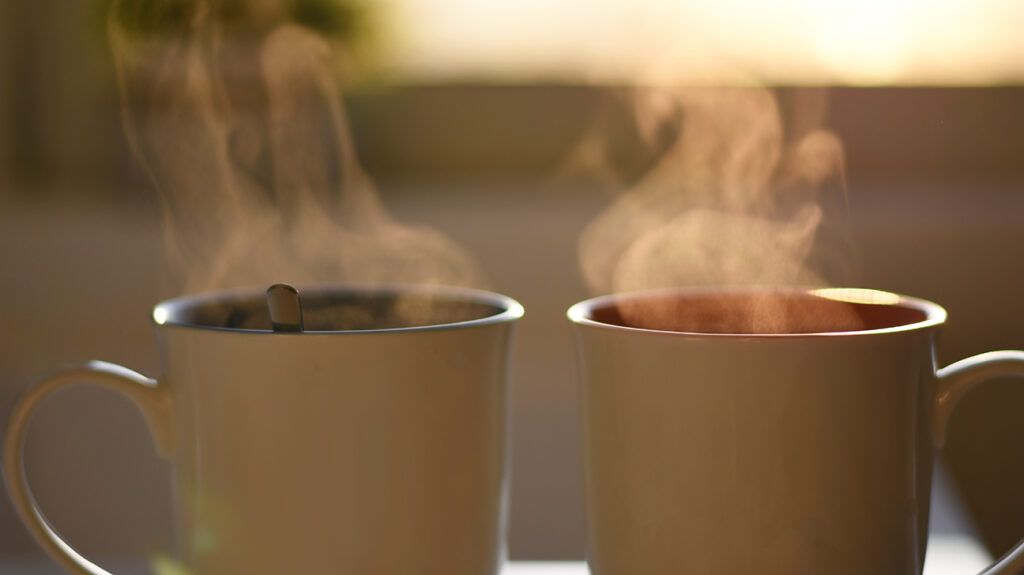You can enjoy caffeine’s mood and energy boost without those uncomfortable symptoms of anxiety like jitters, heart racing, and nervousness. Here’s how.

Most people can safely consume a moderate amount of caffeine, but too much caffeine may lead to mental and physical jitters called caffeine anxiety.
An anxiety disorder persists over time, whereas caffeine anxiety rises and falls with caffeine consumption.
However, the Diagnostic and Statistical Manual of Mental Disorders, 5th edition, text revision (DSM-5-TR) has introduced a subclass of anxiety disorders called “caffeine-induced anxiety disorder.”
You might be wondering, “how can I stop caffeine anxiety?” In addition to working with a mental health pro to manage your symptoms, you might want to try these tips at home to calm your caffeine jitters:
- Limit your caffeine intake.
- Try different sources of caffeine.
- Stay hydrated.
- Practice meditation or stress-reducing exercises like yoga.
- Keep a healthy lifestyle, including:
- diet
- exercise
- sufficient sleep
Caffeine is the world’s
- mood
- concentration
- energy
Can you keep that caffeine bump without experiencing anxiety? Absolutely. But it may take some detective work and dedication.
Limiting your caffeine intake
Here’s where the detective work comes in. First, try figuring out how much caffeine you’re consuming in a day. It might not be as easy as it sounds.
Caffeine comes in many products, and measuring the exact amount can be tricky. You’ll find widely varying amounts of caffeine in:
- coffee
- chocolate
- tea
- energy drinks
- soda
- pre-workout supplements
- some medications
Once you’ve determined how much caffeine you consume in a day, try decreasing it slowly over a week or so to avoid caffeine withdrawal symptoms like headache and fatigue. Over time, you’ll find you can still get that caffeine bump with lower amounts.
Trying different sources of caffeine
Try experimenting with different caffeine sources. Coffee may make you jittery, while green tea makes you mellow. Even factors like when a product is harvested or how it is processed can vary its caffeine effect on you. Tea carries less amount of caffeine per cup than coffee.
Staying hydrated
Practicing meditation and stress-reducing exercises
Stress management practices including mindfulness and meditation can help reduce anxiety symptoms, according to the
Keeping a healthy lifestyle
According to a
- a healthy diet rich in:
- lean protein
- complex carbohydrates
- fruit
- vegetables
- regular daily activity and exercise
- avoiding misuse of alcohol and drugs
- not smoking
Moderate amounts of caffeine can be part of a healthy lifestyle. Research has shown caffeine in lower amounts may have potential benefits, including reducing the risk for:
- cardiovascular disease
- type 2 diabetes
- Parkinson’s disease
- liver disease
- several cancers
- strokes in older women
Caffeine anxiety is the collection of uncomfortable symptoms resembling anxiety that you may experience after overconsumption of caffeine. The
- jitters
- anxious feelings
- elevated heart rate
- digestive issues, including nausea
- headache
- sleep disruption
To avoid negative side effects, the
Genetics may be involved too.
Perhaps you don’t think home remedies are enough and wonder: “Is there treatment for my caffeine anxiety?”
If you have gradually cut back on caffeine, and you’re still experiencing intensified anxiety, you might consider consulting a doctor or mental health professional.
Any anxiety disorder — including caffeine-induced anxiety disorder — is common and treatable with:
- therapy
- medication
- lifestyle changes
